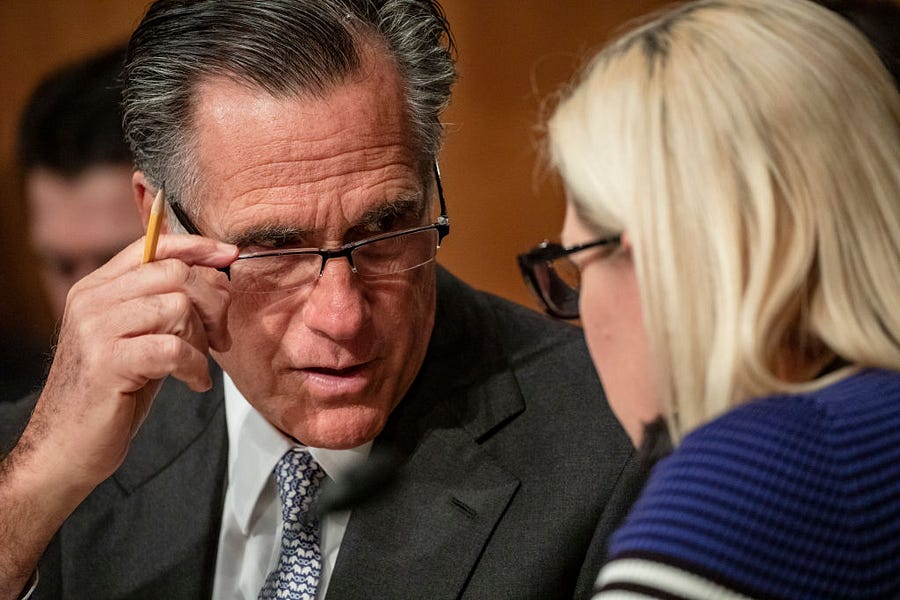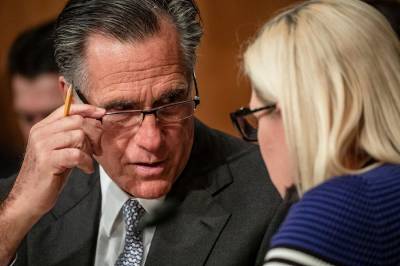It has been said that Washington has two standard responses to America’s challenges: do nothing, or overreact. We are all witnessing President Biden’s $6 trillion overreaction to the (improving) economy and our (very loosely defined) infrastructure needs. At the same time, Washington is doing nothing about an economic challenge that will ultimately cost many times more than $6 trillion and risk the economic security of tens of millions of Americans: the collapsing finances of the Social Security and Medicare systems.
But not all hope is lost. Sen. Mitt Romney (R-UT), joined by a bipartisan coalition of senators such as Kyrsten Sinema (D-Arizona), Todd Young (R-Indiana), Mark Warner (D-Virginia), John Cornyn (R-Texas), Joe Manchin (D-West Virginia), and Rob Portman (R-Ohio)—as well as a bipartisan coalition in the House—has introduced the TRUST Act (S. 1295), which would set up a bipartisan legislative process to keep the Social Security, Medicare, and highway trust funds solvent.
It is not an overstatement to point out that Washington’s long-term solvency and nothing less than America’s economic future is at stake. Over the next 30 years, Social Security and Medicare face a combined $100 trillion cash shortfall. This staggering shortfall is simply the amount of scheduled benefits and resulting interest costs that will exceed these programs’ incoming payroll taxes, benefit taxes, and Medicare premiums. And while some fixate on the raided Social Security trust fund, that comprises just 3 percent of the $100 trillion hole.
These shortfalls account for 97 percent of all new projected debt over the next three decades, meaning that the rest of the federal budget is essentially balanced over the long-term. Paying these programs’ annual cost would eventually require choosing between painful options such as raising the 15.3 percent payroll tax to 33 percent, instituting a 30 percent value-added tax (basically a national sales tax), or eliminating the majority of the remaining federal budget. No, not even 100 percent tax rates on the rich, nor eliminating the entire defense budget, would come close to footing the bill. The middle class will have to pay.
Of course, these figures assume that full Social Security and Medicare benefits continue after their trust funds are exhausted. Under current law, Social Security’s old age trust fund will be depleted in 2032, at which point benefits are scheduled to be cut by 27 percent (and growing each year). Medicare’s Part A (hospital insurance) trust fund will be depleted in 2026, and is scheduled to be cut by 13 percent (and growing). By contrast, Medicare Parts B and D (physicians and prescription drugs)—the largest drivers of Medicare’s shortfall—are legally allowed to run deficits forever.
Given these large deficits and potential cuts, the TRUST Act is quite modest. Restoring solvency to the Social Security and Medicare Part A trust funds would eliminate just one-quarter of the total $100 trillion Social Security and Medicare shortfall. Lawmakers would not be required to address the soaring costs of Medicare Parts B and D, or the $3 trillion (plus interest) cost of paying back the Social Security and Medicare Part A trust funds that had been raided previously.
The TRUST Act does not tilt towards any specific solution. The goals are to prevent trust fund depletion, ensure long-term solvency, and improve the programs. Lawmakers could choose to close the entire gap with new taxes, benefit cuts, or even a Modern Monetary Theory-approach of printing new dollars for the trust fund. There is no ideological pre-determination.
So what would this modest measure do? It would create a separate 12-lawmaker rescue committee for each trust fund that would be equally split between Republicans and Democrats, and between the House and Senate, with a preference for lawmakers on the key committees of jurisdiction. And any committee solution could not be reported out unless it was approved by a majority that includes at least two of each party’s six appointees. In short, any solution must be bipartisan and will likely include key committee leaders.
A final aspect is that any reported solution would still have to pass Congress, and would be subject to a Senate filibuster if it lacks the support of 60 senators.
The bill would also create a rescue committee to keep the highway trust fund from being depleted, which is scheduled to occur next year.
Overall, for anyone who opposes automatic trust fund cuts to Social Security and Medicare—or $100 trillion in new debt—the TRUST Act is the most modest and bipartisan approach to reform.
That is why 71 senators recently voted for a non-binding amendment endorsing the TRUST Act approach. It is supported by the House Democrats’ Blue Dog Coalition, the House’s bipartisan Problem Solvers Caucus, and a group of 30 House Republicans and 30 House Democrats. Deficit-hawk organizations have also endorsed the bill, as well as Erskine Bowles and Alan Simpson (of the “Bowles-Simpson Commission” on fiscal responsibility).
So who is possibly opposing this approach? Groups that purportedly stand for senior citizens, but in practice are sabotaging legislation to save their benefits.
Three left-wing lobbying groups—The National Committee to Preserve Social Security and Medicare, Alliance for Retired Americans, and Social Security Works—have publicly blasted the TRUST Act by misrepresenting the bill as a war on seniors’ benefits. They have called it “a Trojan Horse to cut seniors' benefits” (even though nothing in the bill requires any cuts). They also claim the bill creates “an anti-democratic process” that “would circumvent a deliberative and regular order process” —even though the commission proposal would still go through the legislative process and be subject to a full Senate filibuster. Yes, amendments to the commission-reported proposal would be restricted, but if Congress decides it would prefer an amended (or totally different) version of the commission’s proposal, then it is free to draft and pass any such proposal anytime in regular order outside of the TRUST Act process. Ultimately, any solution will need the same 218 House votes and 60 Senate votes to achieve cloture and pass Congress, followed by a presidential signature.
Not to be outdone, the AARP has encouraged seniors to flood Congress with letters declaring the TRUST Act an “unacceptable” proposal that “could put your hard-earned Social Security and Medicare benefits on the chopping block.”
The great irony—which makes these senior groups’ misleading attacks so cynical and outrageous—is that by opposing an effort to bring Social Security and Medicare into solvency, they are implicitly endorsing a do-nothing approach that would result in these benefits being automatically reduced far more drastically than whatever solution this commission would almost surely be able to pass. Defeating trust fund reforms would automatically result in long-term trust fund solvency achieved entirely through benefit cuts and no new taxes. While these groups give lip service to tax-heavy legislation for Social Security, they are opposing the very commission most likely to bring such a proposal to a vote. And they are scaring seniors into thinking they are the ones protecting their benefits.
As for Congress, drafting legislation, writing letters of support, and voting for non-binding resolutions is the easy part. Congress is known for empty virtue signaling on deficits while enacting legislation to add trillions in red ink. Social Security and Medicare (and their interest costs) are contributing $600 billion to the 2021 budget deficit, and this figure will rise to $1.6 trillion annually in a decade. Yet Congress’ path of least resistance is to do nothing and let the next generation of lawmakers clean up the mess—Washington’s fiscal solvency and America’s seniors be damned. Support for the TRUST Act provides a glimmer of hope, if Congress can follow through.
Brian Riedl is a senior fellow at the Manhattan Institute. Follow him on Twitter @Brian_Riedl.






Please note that we at The Dispatch hold ourselves, our work, and our commenters to a higher standard than other places on the internet. We welcome comments that foster genuine debate or discussion—including comments critical of us or our work—but responses that include ad hominem attacks on fellow Dispatch members or are intended to stoke fear and anger may be moderated.
With your membership, you only have the ability to comment on The Morning Dispatch articles. Consider upgrading to join the conversation everywhere.